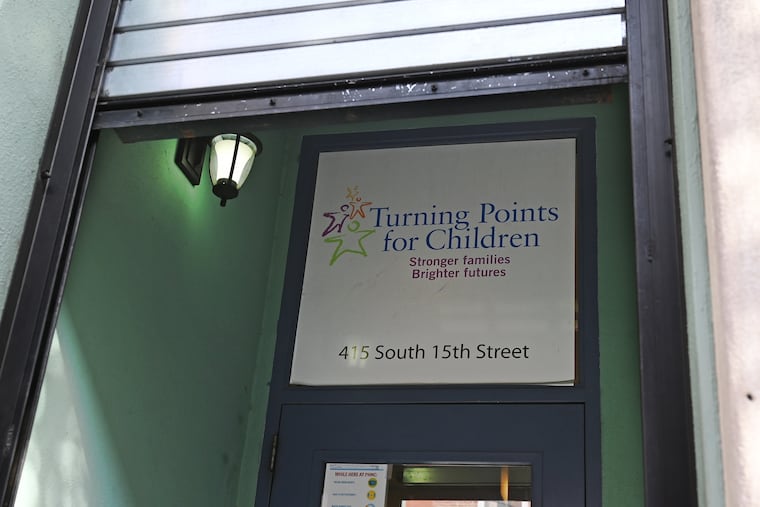Pa. officials say the Philly child abuse case that settled for $6M was kept from them
State and city officials on Friday questioned oversight of the Turning Points agency that returned three sisters to their sexually abusive father.

The Pennsylvania Department of Human Services said Friday it plans to investigate a Philadelphia child welfare agency over its role in returning three girls to their sexually abusive father, who continued to assault them.
The negligence resulted in a $6 million settlement between the girls and Turning Points for Children, the largest child welfare provider in Philadelphia, which serves more than 17,000 people across the city, according to the organization’s website.
Pennsylvania DHS, which provides oversight for each county’s child welfare agencies, said it was not aware of the allegations against Turning Points until being contacted by The Inquirer after the settlement announcement on Thursday.
“We have a responsibility to identify and correct the deficiencies that resulted in a failure to protect the children we serve,” said DHS spokesperson Ali Fogarty. “DHS will be further investigating the situation.”
Turning Points’ name was shielded in the settlement but later identified by The Inquirer through court records.
David Fair, deputy chief executive officer for Turning Points, said in a statement Friday the incident “weighs heavily” on the agency, but did not offer specifics about how it handled the case. ”Our job is to keep the children in our care safe,” according to the statement. “When that doesn’t happen, our duty is to work diligently to determine where changes may help ensure the care and safety of those we serve and mitigate future challenges.”
The Philadelphia Department of Human Resources contracts with the agency to run four of the city’s 10 community umbrella agencies, paying it more than $54 million million in 2020.
The city Department of Human Services refused to answer specific questions about this case, citing a 2013 state law that in part protects child-and-parent privacy in abuse cases.
“We can tell you that DHS investigates serious incidents involving contracted providers,” said spokesperson Heather Keafer.
Nadeem Bezar, an attorney who represented the girls, said the welfare provider had knowledge of the abuse for years, and failed to follow protocols that could have protected the safety and well-being of the three children.
Over a span of four years, the father repeatedly raped his daughters and beat them with an extension cord, while moving them from one home to another, according to the lawsuit. The Inquirer is withholding the identity of the father to protect the identity of the victims.
Following a protective order in 2015, Turning Points removed two of the girls from their father’s grasp, assigning them to homes where they also encountered abuse.
Within a year, the agency — for reasons unknown — returned the girls to their father, despite his facing criminal charges on kidnapping and sexual assault, according to Bezar. Further, the man had no source of income and no fixed address.
“You’re basically giving the children back to a homeless, unemployed man, who has a history of an attempted kidnapping of a woman, and who has recently been accused of trying to sexually assault his girlfriend,” Bezar said Tuesday.
The girls’ father was convicted in 2018 of sexually abusing them and is serving a 37-year prison sentence in central Pennsylvania.
Philadelphia lawmakers said Friday they too want an explanation as to how the case got mishandled.
City Councilmember Cindy Bass, who co-chairs Council’s special committee on child separations, said the onus falls on Philadelphia DHS to ensure city-funded welfare providers never put a child in harm’s way again.
“DHS owes us all an explanation. Turning Points owes us all an explanation,” Bass said. “The idea that they’d be able to sweep this under the rug is totally unacceptable.”
Asked about accountability measures, Philadelphia DHS pointed to annual evaluations of its contractors, data dashboards, and a mayoral-mandated child welfare oversight board, whose quarterly meetings are open to the public.
Even lawmakers have failed to get answers from DHS when trying to unbundle alleged failures in the foster care system — which some attribute to high turnover and a lack of standardized practices across the network of service providers.
At least five caseworkers and two supervisors had been involved in the girls’ case, according to attorney Bezar, which may have led to grave errors like misinterpreting the father’s criminal record and failing to conduct a court-ordered psychosexual evaluation of him.
“We see a lot of turnover with their workers,” said Councilmember David Oh, who co-chairs the committee on child separations with Bass. “They are able to hire people that don’t have qualifications. When issues arise, those people are easily fired.”
Lawmakers said the special committee would examine the issues at a future committee hearing.
Formed in 2008, Turning Points provides supportive services to children in the city’s foster-care system. In recent years, the agency has broadened its footprint to include four city-funded community umbrella agencies, absorbing two centers from Wordsworth, a residential youth treatment center with a history of alleged abuse and neglect that state officials shut down in 2016.
Since that time, the city’s contract work with Turning Points has nearly doubled as the agency’s footprint has grown — from $38 million for billed services in 2016 to more than $54 million in 2020.
The city established its network of community umbrella agencies in 2015. Meant to unify the city’s sprawling foster-care network, the city contracted with third-party agencies like Turning Points to provide family services to more than 10,000 people a year. DHS releases an annual reporting evaluating each agency. Turning Points’ four locations received mixed reports in the latest 2020 report card, while showing improvement from previous years.
The city licenses these agencies to provide family services, but the state DHS maintains general oversight over the contracts and performance.
State officials could not offer a timeline on Friday for their investigation.